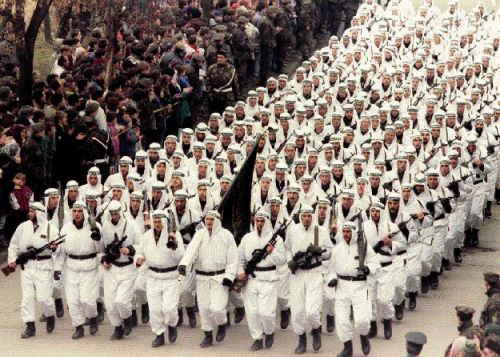Growing Islamic fundamentalism in Bosnia-Herzegovina
John Newton and Eva-Marie Kolman
20/1/2012
Christians and moderate Muslims are trying to stem the tide of Islamo-fascism in the heart of the former Yugoslavia.
The rise of radical Islam in Bosnia-Herzegovina is going unchallenged by the authorities, the country’s leading bishop has warned. Cardinal Vinko Puljic, the Archbishop of Sarajevo, highlighted the growth of extremism in the country during a visit to the international headquarters of Aid to the Church in Need.
The 66-year-old cardinal said that the growing process of Islamisation in Bosnia-Herzegovina is being funded by radicals in the Middle East. He said: “Muslim centres and mosques have been built in many places with petrodollars from Saudi Arabia.”
During the interview with ACN in Königstein, Germany, the cardinal stressed the spread of Wahhabism, an Islamic reform movement, which is the official religion of Saudi Arabia. Many commentators have linked Wahhabism to terrorist movements such as al-Qaeda.
The Archbishop of Sarajevo said that there are already 3-5,000 Wahhabis in Bosnia-Herzegovina and the group is seeking to gain influence in society. Cardinal Puljic said: “Nobody in the government has the courage to do anything to prevent this development.” According to Aid to the Church in Need’s report on the oppression of Christians, Persecuted and Forgotten?, more than 100,000 young Bosnian Muslims have encountered Wahhabi Islam through organisations such as Active Islamic Youth, Furqan, and the Muslim Youth Council. Cardinal Puljic added: “In recent years, at least 70 new mosques have been built in Sarajevo alone.”
Reports state that Saudi Arabian money funded the reconstruction of Sarajevo’s Husrev Begova Mosque which included the removal of internal mosaics in accordance with Wahhabi aesthetics. Another new mosque, the King Fahd Mosque, which is the country’s largest Islamic place of worship, was described by one report as a magnet for Muslim fundamentalists.
While mosques are being built or repaired, Cardinal Puljic pointed out that building approval for churches can be delayed for years – adding that Church property confiscated under communism has still not been returned.
He said that the government “has no interest in giving the Catholic Church back its property” while in most cases Muslim property has been returned.
The Archbishop of Sarajevo went on to say that “Catholics are systematically disadvantaged” and demanded equal treatment for Catholics in employment, education and other spheres of life.
Despite these problems, the cardinal said the Catholic Church is seeking greater cooperation between different ethnic and religious groups. He said: “We are a minority but we are a constructive force that wishes to make a contribution to the success of society.”
Sister Ivanka Mihaljevic, Provincial Superior of the Franciscan Sisters of Christ the King in Bosnia, described how the community had launched a three-year programme called ‘I extend to you my hand for peaceful coexistence’.
Under the programme, Roman Catholics, Muslims and Serbian Orthodox Christians work together to promote tolerance, non-violence and mutual respect.
She told Aid to the Church in Need: “These are small steps of peace and goodwill but we want to imbue the people with courage.”
The country is about 40 percent Muslim and 31 percent are Serbian Orthodox. Catholics account for 10 percent. Of the 820,000 Catholics who lived in Bosnia-Herzegovina before the 1992-5 war, only 460,000 remain and emigration is ongoing.


Lord God bless and protec all our christina brothers and sister.
629946 254243There is noticeably lots of cash to comprehend about this. I suppose you created particular nice points in functions also. 91650
317088 393100I believe one of your advertisings triggered my internet browser to resize, you could nicely want to put that on your blacklist. 878111